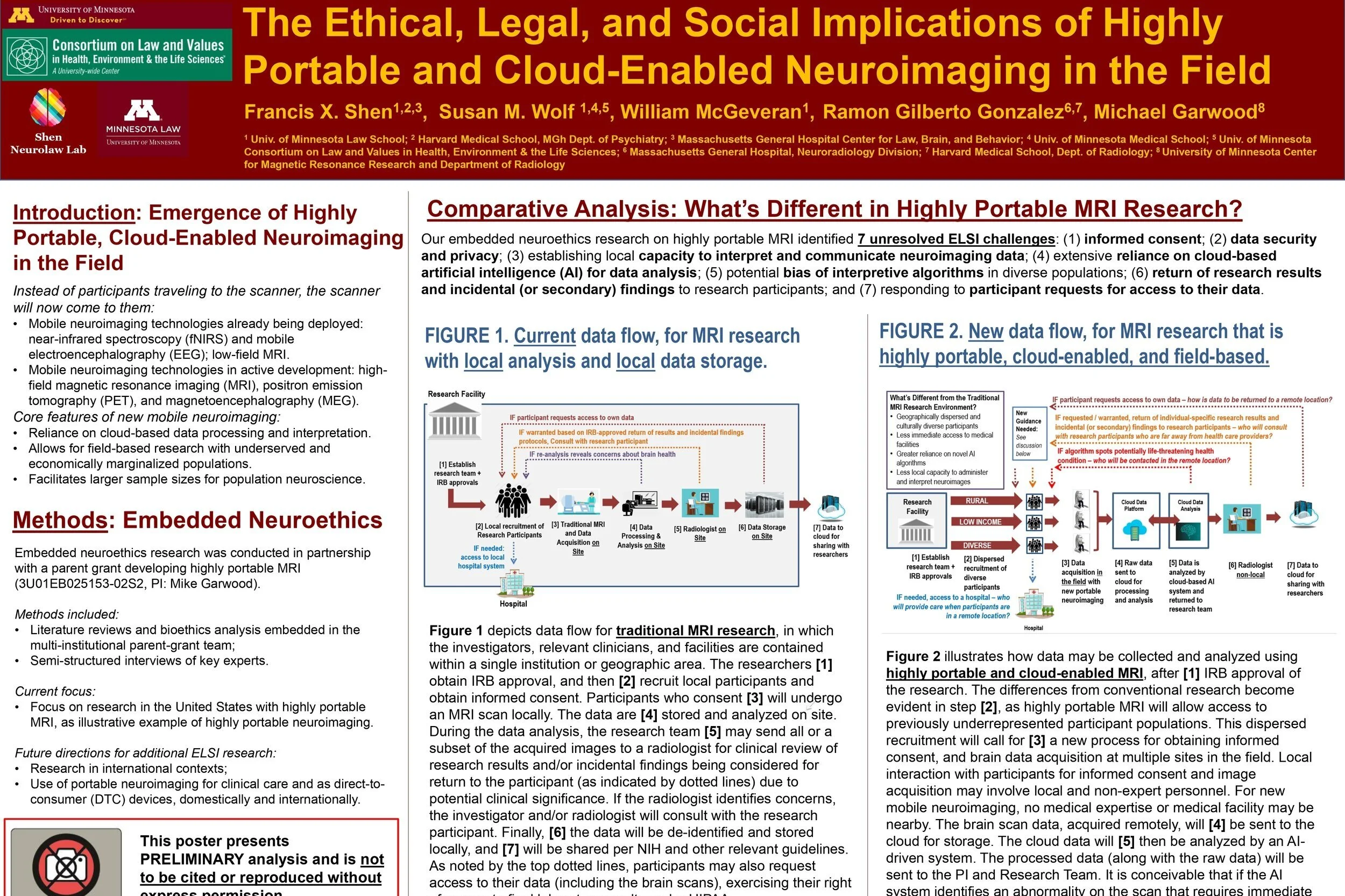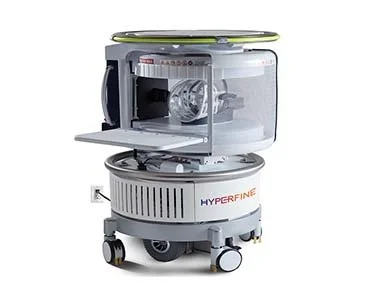
Highly Portable and Cloud-Enabled Neuroimaging Research: Confronting Ethics Challenges in Field Research with New Populations
This website provides updates and disseminates resources related to an innovative project based at the University of Minnesota and supported by the NIH BRAIN Initiative (Grant #RF1MH123698) to conduct empirical research and generate evidence-based consensus recommendations for the ethical conduct of research using highly portable, cloud-enabled MRI in new and diverse populations in field settings. The project includes a national Working Group of top neuroethics, neurolaw, and neuroscience experts.
The Project is based at the University of Minnesota’s Consortium on Law and Values in Health, Environment & the Life Sciences.
Image credit: Alexis KockenSpecial Symposium in Journal of Law, Medicine & Ethics: Emerging Portable Technology for Neuroimaging Research in New Field Settings: Legal & Ethical Challenges
The expanding deployment of highly portable MRI (pMRI) technology for brain research outside the hospital to more remote settings is helping to expand research participation with underserved populations and ensure more inclusive research participation. But the rapid development of pMRI technology has outpaced the ethical, legal and societal implication (ELSI) guidelines necessary to ensure research participant safety and community trust during brain research projects.
A new symposium of nine articles funded by the NIH BRAIN Initiative – “Emerging Portable Technology for Neuroimaging Research in New Field Settings: Legal & Ethical Challenges” – is the culmination of five years of work and addresses those barriers and provides guidance for the successful implementation of pMRI for brain research in the community. University of Minnesota Professors Francis Shen, JD, PhD, Susan M. Wolf, JD, and Frances Lawrenz, PhD, were guest editors of the symposium, which appears in the Winter 2024 issue of the Journal of Law, Medicine & Ethics.
“Portable MRI has the potential to be a game changer for neuroscience research,” Prof. Shen says. “But to achieve that potential we need to address the significant ethical and legal challenges of democratizing access to sophisticated medical technologies in non-clinical settings. The ELSI Checklist in this symposium is a tool we hope all pMRI researchers will utilize.”
● Introduction: Revolutionizing Neuroimaging Research with Highly Portable MRI: Confronting Ethical and Legal Challenges (Francis X. Shen, JD, PhD; Susan M. Wolf, JD; Frances Lawrenz, PhD)
● (Francis X. Shen, JD, PhD; Susan M. Wolf, JD; Frances Lawrenz, PhD; Donnella S. Comeau, MD, PhD; Conducting Research with Highly Portable MRI in Community Settings: A Practical Guide to Navigating Ethical Issues and ELSI ChecklistBarbara J. Evans, JD, PhD, LLM; Damien Fair, PA-C, PhD; Martha Farah, PhD; Michael Garwood, PhD; S. Duke Han, PhD; Judy Illes, CM, PhD; Jonathan D. Jackson, PhD; Eran Klein, MD, PhD; Matthew S. Rosen, PhD; Efrain Torres, PhD; Paul Tuite, MD; J. Thomas Vaughn, PhD)
● Expert Stakeholder Perspectives on Emerging Technology for Neuroimaging Research with Highly Portable MRI: The Need for Guidance on Ethical, Legal, and Societal Issues (Molly Madzelan, PhD; Frances Lawrenz, PhD; Susan M. Wolf, JD; Francis Shen, JD, PhD)
● Far from Home: Managing Incidental Findings in Field Research with Portable MRI (Susan M. Wolf, JD; Judy Illes, CM, PhD)
● The Realization of Portable MRI for Indigenous Communities in the USA and Canada (Shana Birly, MS; Angela Teeple, MLS; Judy Illes, CM, PhD)
● Socioeconomic Factors in Brain Research: Increasing Sample Representativeness with Portable MRI (Martha Farah, PhD)
● Portable Accessible MRI in Dementia Research: Ethical Considerations About Research Representation and Dementia-Friendly Technology (Eran Klein, MD, PhD; S. Duke Han, PhD; Paul Tuite, MD; W. Taylor Kimberly, MD, PhD; Mohit Agarwal, MD)
● The Need for IRB Leadership to Address the New Ethical Challenges of Research with Highly Portable Neuroimaging Technologies (Donnella S. Comeau, MD, PhD; Benjamin C. Silverman, MD; Mahsa Alborzi Avanki, MD; Susan M. Wolf, JD)
● Ethical Oversight and Social Licensing of Portable MRI Research (Barbara J. Evans, PhD, JD, LLM)
Consortium on Law and Values Conference: Emerging Portable Technology for Neuroimaging Research in New Field Settings
Ethical, Legal, and Policy Challenges in Field-Based Neuroimaging Research
Presented by Francis X. Shen and Susan M. Wolf
The Future of Portable MRI in Research: Challenges and Opportunities
Presented by Frances Lawrenz, Damien Fair, Martha J. Farah, and Eran Klein
To watch video presentations, click here.
Keynote presentations: Portable MRI Research: Applications and Opportunities
December 11, 2023
“Highly Portable MRI Research: Lessons from the Field” presented by Sean C. L. Deoni
“Decolonizing MRI Research” presented by Jonathan D. Jackson
Community Engagement and Data Control in Portable MRI Research
Presented by Judy Illes, Angie Mejia, Barbara J. Evans, and Reverend Alvin C. Hathaway
Oversight of Portable MRI Research
Presented by J. Thomas Vaughan, Matthew S. Rosen, Donnella S. Comeau, and Khara M. Ramos
Additional Project Publications and Presentations
Working Group Member Presentations
Matthew Rosen: Building an MRI Scanner 60 Times Cheaper & Small Enough to Fit in an Ambulance
May 20, 2022
As a Harvard Professor, alongside his colleagues at the MGH/A.A Martinos Center for Biomedical Imaging in Boston, Matthew Rosen worked on applications of advanced biomedical imaging technologies. One of several projects was hacking a new kind of scanner that’s fast, small, and cheap. Using algorithms, they can use a weak magnetic field to get good images of our brains and other organs. Someday, people may not have to go to a hospital for an MRI. The scanners may show up in sports arenas, battlefields, and even the backs of ambulances. Dr. Rosen shared his vision of how biomedical imaging has evolved past, present and his views on where disruptive opportunities will be in 5, 10 and 20 years.
What If Mental Illness Could Be Treated with Electrical Engineering?
September 5, 2017
Kafui Dzirasa, MD, PhD. Associate Professor of Psychiatry & Behavioral Sciences at Duke University
Modulating the Mind
March 30, 2020.
Judy Illes, PhD. Professor of Neurology and Canada Research Chair in Neuroethics at UBC
Socioeconomic Status and Brain Development
November 17, 2017
Martha Farah, PhD. Walter H. Annenberg Professor in Natural Sciences, Professor of Psychology - University of Pennsylvania
Why Every Story is a Brain Story
March 30, 2020
Francis Shen, JD, PhD. Professor of Law - University of Minnesota; Instructor in Psychology - Harvard Medical School
To watch video presentations, click here.
Portable and Accessible Neuroimaging News
Neuroimaging technologies are rapidly becoming more accessible and portable. We present here some notable news related to these developments.






















